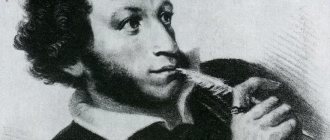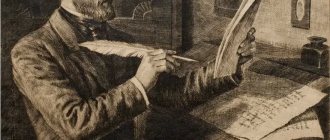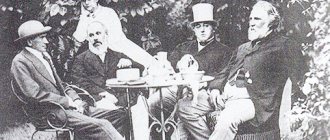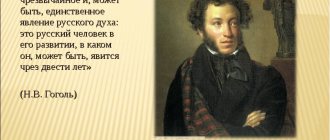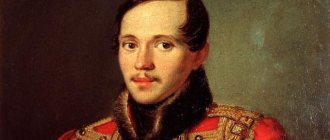- Essays
- On literature
- Pushkin
- The history of the story Shot
The work is the fourth story included in the cycle created by the writer called “Tales of the late Ivan Petrovich Belkin.”
In the first version, the story is written by the author, consisting of one part, describing a duel, and at the end of the work, the writer makes a note that the end of the story is lost, thereby making it clear that there will be no continuation. However, subsequently the writer creates a second chapter, deciding to end the story with the opportunity for the enemy hero to carry out his revenge.
The storyline of the story is autobiographical, since the described incident is taken from the poet’s own life, therefore the prototypes of the work are the writer himself and his military acquaintance named Zubov, whom the poet caught in dishonesty during a card game. In response to the writer's accusations, the offended officer challenges the poet to a duel.
This unpleasant situation arises for the writer several years before writing the story. In life, the poet, having arrived at the duel, calmly eats cherries with an indifferent look and does not pay attention to the shot made by the enemy, which, fortunately, turns out to be a miss. After which the poet renounces his right to shoot, which naturally irritates the second participant in the duel, who wants to comply with the dueling rules. In the story, the writer gives the opportunity to the enemy to exercise his right as a duelist to take revenge on the offender, and it is the shot that becomes the central link of the narrative in the work.
In addition, from the point of view of literary scholars, the image of Silvio is based on another fellow writer, who became the famous duelist Liprandi at that time, who was a well-known linguist who met the poet during his Moldavian exile.
The work has two epigraphs, which are an excerpt from Baratynsky’s poem, as well as an excerpt from the work of Bestuzhev-Marlinsky, although in the original version the writer thought about using a quote from his own poem “Eugene Onegin” as an epigraph, but when writing the story he changed his choice.
The publication of a collection of stories is carried out without indicating the name of the author with reference to the fact that the stories are published by the poet. The cycle of stories is received mediocrely by the literary community, but the work telling about the duel is rated positively among other stories by contemporaries.
Test with answers: “Shot” by A.S. Pushkin
1. The work “Shot” was written in: a) 1830 + b) 1820 c) 1825
2. In which cycle is the work “Shot” included: a) “Little Tragedies” b) “Belkin’s Stories” + c) “Officer Stories”
3. Indicate the genre of the work: a) Short story b) Novel c) Tale +
4. Which literary movement does the work belong to: a) Realism + b) Modernism c) Classicism
5. Narration in the work “Shot” from the perspective of: a) Count B*** b) Silvio c) The Narrator +
6. Silvio’s greatest passion was: a) Playing cards b) Shooting a pistol + c) Beautiful ladies
7. This incident shook Silvio’s reputation among the military: a) Silvio lost a large sum of money and did not want to repay the debt b) Silvio challenged a weak opponent to a duel as a joke c) Silvio did not take revenge on the officer who threw a candlestick at him +
8. Silvio finished the first duel with his opponent without firing back because: a) Silvio was infuriated by the opponent’s indifference + b) Silvio recognized him as his brother c) Silvio was afraid that he might kill a man
9. Silvio received a letter with the following content: a) Silvio’s rival died in a duel b) Silvio’s father was dying c) Silvio’s rival is going to get married +
10. This item was a monument to the last meeting of Silvio and the count: a) Silvio’s forgotten pistol b) Shot through painting + c) Shot through cap
11. He always jokes, Countess, once he gave me a joking slap in the face, jokingly shot me through this cap, jokingly now he missed me; now I too have the urge to joke…”, we are talking about: a) Count + b) Silvio c) Young officer
12. Silvio did not shoot at the count during their second meeting because: a) He didn’t want to scare the count’s wife b) The count’s confusion and timidity was enough to see + c) Silvio’s pistol turned out to be faulty
13. Words: “You will remember me. I commend you to your conscience” belong to: a) Silvio + b) Narrator c) Count
14. What leading theme does the author raise in the story “Shot”: a) The theme of war and honor b) The theme of native nature c) The theme of the role of fate and chance +
15. Officers of the army regiment met: a) Silvio + b) Fedor c) Adrian
16. The mysterious man previously served: a) In an army regiment b) In a hussar regiment + c) In the navy
17. The hospitable host treated the officers to: a) Wine b) Vodka c) Champagne +
18. What did Silvio possess at the highest level: a) Hand-to-hand combat b) Pistol shooting + c) Wrestling
19. What do the officers think about Silvio: a) That he is a poor fellow b) That he was kicked out for his evil character c) That he shot someone +
20. The visiting officers played: a) Backgammon b) Cards + c) Chess
21. A young officer, suspecting Silvio of making a mistake in calculating the bank: a) Threw a gun at his head + b) Insulted him c) Hit him
22. Silvio reacted to the officer’s attack as follows: a) Hit b) Asked to leave + c) Challenged him to a duel
23. Silvio, when he received the package, was: a) At the table b) At the ball c) In the regimental office +
24. Having received the package, Silvio said: a) That he would fight b) That he was leaving + c) About the next dinner
25. Who came to the regiment when Silvio served there: a) Silvio’s cousin b) The son of an officer c) A rich and noble guy +
26. The newcomer offended Silvio in this way: a) Tripped him b) Slapped him in the face + c) Verbally insulted him
27. At dawn after the incident, the following took place: a) Duel + b) Fight c) Fight
28. Where did Silvio’s opponent hit when he shot: a) He missed b) Silvio’s comrade c) His cap +
29. Silvio was outraged by: a) The indifference of the enemy + b) The gloating of the enemy c) The courage of the enemy
30. Where did the Count hit when he shot Silvio: a) In the hand b) In the basket + c) In the cap
23
O. Y. POVOLOTSKAYA
“SHOT”: COLLISION AND MEANING
I shot and, thank God, I missed.
The specific event on which the story “The Shot” is based is the story of the duel between Silvio and the Count; a deadly feud that ended in an unexpectedly happy outcome. The count, sentenced to death by his implacable enemy, turns out to be pardoned by him. This is the plot of this story. In order to understand the meaning of what is being told, to find out the pathos of the writer Belkin, who chose this very living material for his story, it is necessary that the plot be filled with specific historical, social, individual psychological content. The reason for the fight between the count and Silvio was hatred of Count Silvio. The motives for this hatred need to be understood.
The language of Silvio’s self-awareness, the language of his self-definitions is presented in the story in the story of Silvio himself. The most significant thing about Silvio is that he is a former hussar. Moreover, Silvio’s hussarship is not only his social identity, but also the dominant feature of his self-awareness. Silvio begins his story about himself with the following detail: “I drank the glorious Burtsov, sung by Denis Davydov.” In the poems of D. Davydov, Burtsov is called “the hussar of the hussars,” which means that Silvio, who challenged primacy in one of the first “hussar virtues” (drunkenness) against the very model and standard of all hussars, himself once embodied (in his actions, in his appearance, in his way of life) the entire unwritten code of hussar behavior, in his regiment itself was a guideline for the officer noble youth.
To understand the processes that took place among the Russian Europeanized nobility at the beginning of the 19th century, understanding the phenomenon of “hussarism” is of great importance. “Hussarism” as a way of self-realization, as a type of behavior, as a life
24
the position has its own aesthetics, its own cultural basis and is directly related to the living process of assimilation of the ideas of European culture by Russian noble youth. When the opposition “poetry - prose” appeared in the cultural consciousness of the nation, then the aesthetics of hussarism turned out to be identified with poetry in life, that is, under the influence of the ideas of European romanticism, the sphere of poetry began to be understood not narrowly literary, as just writing poetry, but much more broadly: as freedom from the norms and rules of life of the rest of the “non-hussar” world, declared throughout the hussar’s lifestyle. The poetry of hussarism is opposed to everyday life, etiquette, and any regularity of life. (See the article by V. E. Vatsuro “Denis Davydov - poet” in the book: Denis Davydov. Poems. L., “Soviet Writer”, 1983).
The type of “model” hussar - a rake, a drunkard, a duelist, a brave daredevil, valuing nothing except his hussar honor - was formed under the influence of the historical need to develop a new ethics, with a new hierarchy of values, justifying a person’s life not through his inherited, family placement in life, but through his personal properties and qualities. Of course, the distance from the democracy of the hussars' feast to the conscious political movement of the Decembrists is enormous, but the poetry of hussar freedom is the soil that prepared many phenomena in Russian history of the 19th century. The understanding of freedom as the highest value of human life, declared by European post-Renaissance culture, began to be mastered in Russia with the hussars’ “jokes”, those pranks and pranks that were far from harmless for the rest of the “non-hussars” of reality, examples of which are very expressively presented in Belkin’s stories ( the most striking of them are the hussar Burmin getting married to someone else’s bride, the hussar Minsky taking away the stationmaster’s daughter, deceiving his father). The meaning of these jokes is that the hussar, thanks to his dexterity, intelligence, courage, takes from life what he wants, wins for himself what, from the point of view of the rest of the world, he has no right to. A real hussar is always a winner, a conqueror, and what is important to him is not the final result, but the way of life itself: from victory to victory, and therefore the ideal hussar is selfless in his own way: he strives not for wealth, not for marriage, not for a career, but only for glory and victory, which is always a sign of the individual’s superiority over circumstances
25
life. One of the consequences of such a life program is that the ideal hussar always laughs, and the biggest disaster in life for him will be the laughter of others at his expense. A real hussar cannot be funny or ridiculed; this unspoken code of honor does not allow him, which requires him to challenge a scoffer to a duel; to put it in poetic hussar language, one can say that an insult should only be washed away with blood. (As an example of typical hussar behavior that protects a hussar from the possibility of being ridiculed, one can cite lines from D. Davydov’s autobiography: “In the years of Davydov’s ticklish youth, the slightest condemnation of the gloss of his boots, the fabric of his mustache, the appearance of his horse would throw his hand on his pistols or the handle of his Circassian saber "
Silvio begins his story like this: “You know me, I’m used to being on top, but from a young age it was a passion in me.” This is Silvio's first and most significant self-determination. By the way Silvio values his primacy, and by the way he carefully hid his origin, fortune, and real name from everyone, one can understand that fame among his fellow servicemen and primacy for him have the meaning of personal victory over the unfortunate circumstances of his birth. It must be understood that Silvio did everything to overcome the inferiority of his apparently plebeian origin: he made everyone respect himself, fear himself, adore himself, admire himself, and the question of his origin was removed by itself. Retired Lieutenant Colonel I. L. P., the narrator of the story “The Shot,” notes: “No one knew either his condition or his income, and no one dared to ask him about it.”
Silvio's championship is carried out in the circle of the enclosed space of the hussar regiment. The appearance of the Count brought a different scale of dimensions into Silvio's field of vision.
The story contains guiding signs by which one can judge that the inequality between the characters is not fictitious, it really exists. This real inequality has not been and cannot be overcome by the personal efforts of the heroes and remains even when their internal human conflict has exhausted itself. Silvio is an unborn man; no one knows his origin and true name; its non-existence is unconditional. Belessness must be understood as the absence of rootedness in
26
life, lack of soil: Silvio has no family, home, parents, he is not married, his personal belongings are two suitcases in a cart. It makes a lot of sense to indicate in the story his relationship with books: they are not cultural value for him: “He had books, mostly military books and novels. He willingly gave them to read, never demanding them back, but he never returned to the owner the books he had borrowed.” This attitude towards the book indicates that the hero’s cultural horizons are not too broad. The Count is presented in a fundamentally different way in the story. Even before we meet him personally, we get acquainted with his office, where cabinets with books, bronze busts, paintings and luxury items indicate that behind the count’s personality there is a large, undefined field of the historical and cultural life of all mankind. In this life, the Count is accepted by right of birth as the legal heir: the entire European civilization and culture is at his service, all the achievements of human genius are open and accessible to him. If Silvio is only himself and he always acts in life only for himself, then the whole order of reality vouched for the count, recognizing his legal right to all the riches of life, to all its possibilities; the graph is not equal to itself. It is clear that the cultural and historical horizons that determine their behavior are different.
Competing with the Count, Silvio finds himself forced to feel the artificial limitation of the sphere of his existence, to realize the relativity of his brilliant primacy in relation to some other scale of life. An aristocrat with a big name, rich, educated in society, the count in the hussar regiment came from a world that was inaccessible to Silvio, unknown and completely closed. The democracy of the hussar brotherhood makes the aristocrat count and the plebeian Silvio equal according to the code of hussar ethics, which recognizes only free competition in personal merit and abolishes all privileges received by inheritance. However, Silvio cannot agree to friendship with the count, with this “brilliant lucky man.”
Silvio’s hatred of the count cannot be considered simply the envy of a proud plebeian for the successes of a well-born, rich aristocrat; the problem is deeper than just psychological conflict. Friendship with the count is impossible for Silvio, because there is no real equality between them, Silvio’s drama is that he can only be
27
first, so as not to be unequal, so as not to reveal his inferiority. Silvio painfully feels his doom for primacy; he vitally needs it to maintain a distance between himself and the rest of the world. Friendship and equality are impossible for Silvio, because in friendship a person opens up to another; the space of Silvio’s inner life cannot be accessible to anyone.
Silvio, having received the Count coldly, finds out the real value of his opponent’s personal qualities. It turns out, to Silvio’s despair, that the count can leave him without regret, that he does not need the help of the “idol of the regiment” in order to achieve brilliant success himself. Silvio’s primacy wavered; he was painfully aware that everything that he considered unconditional, for example, the unconditionality of his composure, courage, will, intelligence, was destroyed simply by the fact of the presence of a “brilliant lucky man” in the regiment. N. Ya. Berkovsky very accurately notes: “It is significant that Silvio’s rival, an aristocrat and a rich man, is worth a lot as such: he is handsome, gifted, and courageous. Silvio is not allowed to think that in the competition with the Count there are only external advantages against him. He is not allowed to think that there is a struggle between personality and personality. It is painful for Silvio that in the graph the boundaries between the generic and the personal constantly disappear. The count’s superiority is due to the fact that the count is helped by many and different forces, personal forces combine with clan and social ones... The count goes through life easily, he has the calmness of a person for whom clan, caste, the whole order of society, as it was and is, vouched for. Whatever the count does, he always has a reserve of possibilities. The count always has plenty of choice.”
Silvio is looking for a quarrel with the count, hoping, by placing him against the barrier, to discover secret weak points in him. Silvio provokes a quarrel with epigrams against the count, but the count wins this competition too: his epigrams turn out to be more unexpected and sharper than those of his enemy. Silvio feels that he cannot offend the count, force him to recognize the reality of Silvio, the significance of Silvio’s figure, the importance of the war Silvio declared on him. From the point of view of the hussar regiment, inside this world, the quarrel with Silvio was a very important event, but the count could allow
28
you won't notice it yourself. Silvio’s hatred does not have its source in envy, it is essential, existential, ontological, for in it is the helplessness of the victim, the torment of a person whose reality of existence is canceled, this is the hatred of the person being killed for his killer. In order for Silvio to overcome this conflict, so that he can find new grounds for preserving self-respect, he needs to experience a revolution in his own consciousness, go beyond the hermetic world of the hussar regiment, find out his significance and worth in life in the face of the open space of his whole life. The narrow world of hussarism did not save Silvio from the internal fundamental problems of his self-awareness, the main one of which is how, despite his humiliating plebeian origin, to place himself in the world unconditionally and absolutely with dignity?
Finally, a quarrel with the count took place, but in a form completely impossible for Silvio. Silvio’s entire external, very thoughtful appearance, that aura of a romantic, unusual, inaccessible, strong personality that Silvio created around his person, was destroyed the moment the slap sounded; it became abundantly clear that all of Silvio’s “brilliant championship” was not a reliable guarantee against the monstrously humiliating fate of being beaten in the face, and, moreover, publicly, in the company of ladies. For Silvio, a slap in the face is a disaster, because a slap in the face is no longer a code language of honor, other meanings are read here from the field of completely different human relationships: direct assault (give the offender in the ear, in the eye, in the snout) is, firstly, a trait common people, and secondly, lordly in relation to the slave. The ease of the instant reaction with which the count hit Silvio, about which Silvio will later say: “jokingly slapped me in the face,” is the full measure of the lordship inherent in the count, which manifests itself absolutely directly, without reflexivity, I would like to say, innocently, at that moment, as he punches Silvio in the face. This cannot be proven, but it seems quite obvious that Silvio could never hit anyone in the face, while it is not difficult for him to kill the offender in cold blood and mercilessly.
For Silvio, from within his hussar worldview, a duel is the only situation in which
29
the problem of primacy is resolved. For Silvio, a duel is high poetry, a ritual action; he is endlessly concerned with the very situation of the duel. For Silvio, as he understands a duel, this is a situation of the very last seriousness of life, where in the face of death equal rivals stand and the cooler, stronger in spirit, more accurate and braver wins. A duel is the only situation in life where a joke is inappropriate.
The Count reduces the duel with Silvio to base prose, completely profaning with his behavior the solemnity and importance, from Silvio’s point of view, of the situation of their duel. Silvio came with three seconds at dawn; The count made himself wait, came with only one second, “when the sun had risen and the heat was already rising,” and with a cap full of cherries. Standing under fire from a mortal enemy, the Count eats berries, choosing those that are ripe, and spits out the seeds so that they reach Silvio. His entire behavior is designed to express how little he is disturbed by the fact of the existence of his mortal enemy; Moreover, it literally implements the common expression “I don’t give a damn about...”. The Count shows that in his mind the fact of Silvio's existence can only be a reason for a joke. Having given the count his right to fire the first shot, Silvio became a target for a marksman who “jokingly... shot through his cap.” This shot turns out to be no less terrible for Silvio than a slap in the face, for it clearly demonstrates how much the mortal danger posed by Silvio does not bother the count. Silvio had one weapon in the struggle of life: he constantly shows readiness for battle, he is always ready to punish his offender with death, his pride has always been protected by his fearlessness; Silvio's championship in the regiment was ensured, not least of all, by the danger that clearly emanated from him. The Count does not value life to the same extent that Silvio does not value it. However, all his behavior clearly brings to the attention of Silvio that he can kill him, but this is not yet a reason for the count to turn his attention to Silvio. The count's behavior in the duel was quite infernal; he managed to lead Silvio through all the circles of hell of his own lack of freedom; whether he wanted it or not, he pointed out to Silvio that all the latter’s claims to a significant role as a free and possessing
30
the full-fledged reality of a person does not mean anything in itself; Silvio has no way to force the Count to recognize his, Silvio, reality.
Silvio's initial life goal is his claim to absolute primacy among people. But the duel with the count revealed a clear boundary beyond which extends a living space that is absolutely inaccessible to Silvio as he is. Silvio is clearly shown that there is a certain hermetic world with its own culture and its own ideal of a person, and that for this world Silvio is unacceptable as a person of “bad taste.” By his behavior during the duel, the count seemed to say to Silvio: “You hate me because I am well-born, rich, handsome, brilliant and brave. Yes, I am happy with all this, well, kill me, but this will not bring you one step closer to me, for you are a plebeian and the motives of your hatred are not high, but low.”
By laughing at Silvio, the count provoked a direct furious reaction, but Silvio realized that a shot at the count at the time of their first fight was impossible, because this shot had been ridiculed by the count in advance as “plebeianism” and “unfreedom.” Silvio managed not to shoot at that moment, because he realized that this shot would not solve his life problem. This is how the plot of Silvio’s duel with the count begins in the story “The Shot,” and the conflict of the heroes turns out to be an expression of very significant historical, social and universal contradictions in Russian reality.
It should be noted that if Silvio consciously embodies in his life the aesthetics of a romantic hero - a demonic personality who has no human weaknesses, a person who has completely overcome the fear of death, a person outside of time and space, with a mysterious fate, with an aura of mystery - then in The count's behavior consciously embodies the aesthetics of the classical aristocratic fate of the chosen one and favorite of Fortune. The young count is a poet in life no less than Silvio, and his behavior in a duel is a brilliant deadly game, a demonstration of complete invulnerability, absolute self-sufficiency, complete superiority over everything and everyone, complete contempt for everything, including his own death. Before us is almost no longer a man, but a young god - free and laughing, knowing neither pity nor fear.
31
In the first clash with the Count, Silvio lost: the integral poetic image of the “hussar of hussars” was destroyed. Silvio is retiring because after the experience of a collision with the count, the world of hussars became too small for him, military service became meaningless, and being a hussar no longer saved his pride. Silvio's new poetic, demonic role will be carried out in a different living space. Silvio’s revenge is to become the punishing instrument of fate in the life of the “brilliant lucky man” at the happiest moment of the count’s life - the moment of his happy marriage. Silvio’s plan is a plan for an invasion into that closed sphere of life for him, a plebeian, on behalf of which he received a slap in the face, was ridiculed and morally destroyed.
The measure of the impossibility for Silvio to live without responding to an insult is the complete subordination of the entire structure of his life for six years only to this idea of his. After the first fight with the count, Silvio’s life, secretly from everyone, turned out to be merged with the life of the count; he no longer belonged to himself, could not freely manage his life and even refused to fight with the “drunken madman R”, giving reason to young army officers to be disappointed in his courage (an act unthinkable for young Silvio). Silvio himself, explaining this, will say: “I have no right to expose myself to death. Six years ago I received a slap in the face, and my enemy is still alive.” Leaving to take revenge, Silvio utters the following words: “Let’s see if he will accept death before the wedding as indifferently as he waited for it behind the cherries.” Apparently, no one - neither the reader of this story, nor the narrator, nor Silvio himself - doubts that only a miracle can save the count from death.
Silvio himself mistakes his hatred for the count for a desire to kill the enemy, but it is not the enemy’s corpse that Silvio needs; if he needed a dead enemy, he would not have postponed the desired murder indefinitely. Silvio needs to find that life situation in which the count cannot help but reckon with his being, with the fact of his existence.
The story of the second fight is told in the story “The Shot” by the count himself. From the very first words of the count: “I owe the best moments of my life and one of the most difficult memories to this house,” the most important theme of his life is outlined - a happy marriage for love. This theme is supported by the impression of the narrator,
32
who visited the count's house and saw the beautiful countess, as well as harmony and peace in the relationship of the spouses. Silvio appears at the count's house demanding the latter's life at the moment when the count's life no longer belongs to him. Silvio invades the sphere of the count's life as an "inexorable fate", is an evil genius, a demon of death from a long-forgotten past, and if the pathos of this invasion was for Silvio to prove his reality, his significance, then he achieved this from the very first minutes of his appearance. The Count is horrified: “I felt my hair suddenly stand on end.” But before the count could be so terribly frightened when he recognized Silvio, he forced his enemy to experience no less dramatic horror - by not immediately recognizing him. “You didn’t recognize me, Count,” he said (Silvio. - O.P.
) in a trembling voice." The most terrible possibility looms here for Silvio - to simply find himself unrecognized. If the count had really forgotten his enemy, then this would have been the most tragic sentence for Silvio, a complete abolition of his reality, a complete denial of his right to exist in the sphere of the count’s life. (If the story ended here, then this plot point would state the presence of fatal inaccessibility, complete isolation from the rest of reality of the aristocratic layer of Russian life, complete class hermeticity and the absolute determination of a person in Russia by his social affiliation. This would be a terrible verdict on Russia. Unrecognized Silvio would have found himself in the position of a tragic hero, his claims to the role of the arbiter of justice by destroying the enemy would have been justified.) But the count recognized Silvio, moreover, he without hesitation recognized his right to shoot, measured twelve steps and stood unarmed under the pistol of his mortal enemy, who was six I've been waiting in the wings for years. The Count asks only one thing, “to shoot faster before his wife returns.” “All my thoughts were about her,” says the count. This whole new duel takes place under the sign of first the secret, and then the obvious presence of the countess; the count's marriage determines the entire situation of the second duel. The Count immediately introduces the fact of his new marital status into the circle of Silvio’s consciousness, mentioning his wife, the Count makes Silvio a participant in his life, opening her inner space, that is, Silvio immediately receives
33
exactly what was once denied to him; and Silvio hesitates. Although he sees that the count is frightened, confused, timid, that there is not a trace left of the former arrogance of the “brilliant lucky man”, the role that Silvio is now playing is too similar to the role of a murderer, a low role and degrading to his dignity. Again offering to draw lots, Silvio rehabilitates himself, but puts the count through a painful test: for the first time in his life, the count finds himself in a position of hopeless lack of freedom, humiliating and terrible for him. He is forced to go through those circles of hell of this lack of freedom, through which he once mockingly led Silvio. Agreeing to a repeated draw is a violation of the code of honor, it is a shame and humiliation for the count, but with his consent the count removes the charge of bloodthirstiness from Silvio and recognizes his high role. The Count draws out the first number, and Silvio introduces the idea of his special happiness into the circle of his consciousness, saying: “You, Count, are devilishly happy.” The definition of “diabolical” is an accusation, there is Silvio’s hard-won conviction that an evil, devilish principle is rooted in the count. For Silvio, the Count is the embodiment of the evil of class privilege; he despises him for his fear, timidity, and acceptance of new conditions of the duel. Silvio, freely standing under the count's shot, symmetrically repeats the situation of their first duel, but now the meaning of the count's shot at him is directly opposite to the comic shot that pierced Silvio's cap: the count shoots, trying to eliminate the terrible danger posed by Silvio.
The count's mistake is for Silvio the first obvious failure of the enemy, his loss; at this moment the image of the “brilliant lucky man” for whom fate always bewitches is destroyed. The halo of chosenness turns out to be removed from the count, therefore, Silvio’s secret, painful question about whether their initial human positions are equal becomes clarified. There is nothing special, “devilish” in the count’s nature, and this means for Silvio that the count and his world are vulnerable, that Silvio is free to carry out his judgment, that there is no predetermination. The count's mistake is a truly happy moment in Silvio's life.
And therefore, summing up his visit to the count, Silvio will say: “I am pleased: I saw your confusion, your timidity; I made you shoot at me, I've had enough. You will remember me. I commend you to your conscience." However, between the miss
34
Count and with these words to Silvio, an event occurred that allowed Silvio to see everything that was happening in a completely different perspective - the appearance of the Countess. While the countess has not yet appeared, he does not yet understand all the internal motives of the count’s behavior, and therefore, measuring the count with his own yardstick, he still does not know why the count sacrificed his pride, his honor as a nobleman, agreeing to a repeated drawing of lots. The Count is in a hopeless situation: he should not shoot at Silvio, it is dishonorable, but he cannot help but shoot, it seems to him that this is the only chance to protect his home, his happiness, his love (“All my thoughts were about her”).
The Count's shot at Silvio is the most significant event in the story. Here is his obvious crime, his willingness to base his happiness on human sacrifice, this recognition of Silvio as a murderer, despite the fact that he is already a noble man. The significance of this particular central moment is emphasized in the story through the reaction of the listeners: “His face burned like fire, the countess was paler than a scarf, I could not help exclaiming.” Everyone understands that the Count’s terrible human guilt is rooted in this shot. In the text of the story, this event has two designations: first the count will say: “I shot and hit this picture,” immediately after that he repeats somewhat differently: “I shot and, thank God, I missed.” The first means only a random coincidence of circumstances, the second interpretation means the count’s refusal to measure what happened by the small standard of earthly empirical reality. “Glory to God” - a common interjection in the Russian language - in this context receives the energy of a prayer of gratitude; the real meaning of this clause is that the count sees in his mistake a miracle, a gracious intervention of God’s providence, averting the hand of a blind man ready to commit an irreparable crime.
Like all the other endings of “Belkin’s Tales,” this one can be called happy, but the characters in the story themselves perceive the denouement of their story as a suddenly accomplished miracle, because, contrary to the entire course of developing events that directly led to a bloody catastrophe, the story ends illegally from the point of view earthly logic. Instead of the expected tragedy, a worthy outcome is discovered that does not humiliate anyone.
35
It seems paradoxical that the Count thanks God for his mistake, yet he is happy precisely because he received his life from the hands of Silvio, and did not lay his corpse as the foundation of his marriage and home. A mistake is not only the count’s happiness, it is the first and last moment in Silvio’s life, when he finds himself in a position of true freedom in relation to the entire space of life: in front of him is his humiliated and timid enemy and offender, and Silvio experiences a moment of absolute triumph of power, when the count's life is in his hands, and the count is going through an obviously terrible and desperate moment. And at the moment when retribution was about to take place, the miracle of the appearance of the count's wife occurs. “Masha runs in and throws herself on my neck with a squeal,” this is how the count himself talks about this appearance. If the male behavior in the story “The Shot” is semiotically very complex, multifaceted, ambivalent, conditioned by the laws of aesthetics of a consistently implemented life program, then the countess’s squeal and her kneeling plea are an absolutely unetiquette, but certainly direct language of feelings. The role of the Countess’s appearance in this situation is that Silvio is given the opportunity to clearly see the hidden motives of the Count’s behavior. Suddenly a certain inseparability, an inextricable connection between husband and wife is revealed. If before this, in Silvio’s mind, the Count existed as a separate human figure, then at the moment when the Countess, without hesitation, throws herself on her knees in front of him, driven only by love and begging for mercy and mercy, the judgment of justice that Silvio must perform suddenly turns out to be unlawful. The Countess's representation and her plea open up other perspectives on the meaning of what is happening: the murder of a husband in front of his wife's eyes - this is how the role of Silvio is translated from the plane of high poetry into the language of prose of life. And then a shot at the count turns out to be simply impossible, the language of dueling poetry is canceled due to its complete inability to express the Truth. And, already free, Silvio knows how to understand this. Not killing is the only worthy and noble solution.
The semantics of Silvio's last gesture - his shot at the painting shot through by the count - can be read, firstly, as the unconditional completion of the duel (shot for shot; the duel is over), and secondly, Silvio demonstrated to the count his art of marksmanship, so that he would not have any left. not the slightest
36
illusions about the degree of his doom if Silvio’s shot was aimed at him. Silvio was not generous when he practiced shooting for six years in order to give his hand fidelity to the punishing “hand of God,” but his masterly last shot clearly expressed the complete unconditionality of his human worth, the guarantee of which is an indelible mark in the count’s memory of the generosity of this man, a testimony which is why the count’s confession story about the duel with Silvio appeared. (Let us remember Silvio’s farewell words: “You will remember me.”)
The count's story is the result of his meaningful life experience. Between the count, who easily hits Silvio in the face, and the count, who tells his provincial neighbor-landowner the story of his crime, a whole life has passed, morally regenerating the arrogant aristocrat into a man capable of respecting his human dignity in everyone.
Compositionally, the story “Shot” is structured as a chain of stories from different people. It can be said that the story, in addition to the main plot - the duel between Silvio and the Count - also contains the plot of the recognition of this story by Lieutenant Colonel I. L. P. that develops on top of it. The reader is given the opportunity to trace the very birth of the legend, its separation from the flow of life.
Firstly, for Silvio to tell the story of his insult, which had not yet been washed away by the blood of the enemy, it was necessary for him to become vitally necessary to justify himself in the eyes of I. L. P.; Thus, it becomes obvious that the readers of this story owe their knowledge of this story to the human qualities of I. L. P., who earned the trust and respect of Silvio. The count himself, having learned that I. L. P. was Silvio’s confidant, considers it his duty to tell this man how Silvio took revenge for his insult. Both narrators show nobility: neither one nor the other whitewashes themselves. Endowed with their trust, the narrator of the story, as it were, receives their sanction for the right to tell this story to the world as the only person in whose horizons all the beginnings and ends of this complex event converged, the material trace of which is silently preserved by a picture shot through by “two bullets planted one on top of the other.” .
In addition, the very plot of the story of the fight contains the rationale for the possibility of telling about it: a miraculous mistake
37
The count and the timely appearance of the countess made possible a happy ending, and therefore this story. Any other outcome of the relationship between the count and Silvio would have kept the history of the relationship between the heroes of the story secret from all people.
The story so carefully substantiates all the necessary conditions for the birth of this story as a legend that its very birth from the sea of \u200b\u200beveryday looks like a miracle, because even if it happened, this story might not have received its narrator. Thus, the modest Lieutenant Colonel I. L. P., living out his life as a provincial landowner, suddenly acquires the significance of a man testifying to a miracle, and the modest author of the stories Ivan Petrovich Belkin, who recorded this story, which exudes the wonderful light of the brilliant victory of Good, Life, Love and Beauty, it turns out, exactly complies with the requirements for the chronicler and writer of the ancient Russian literary tradition - only that which serves to glorify the works of God is worthy of being captured and preserved in memory and in a book.
Saint Petersburg
Chapter from the work on “Belkin’s Tales”. See also “Moscow Pushkinist”, no. I, , III.
